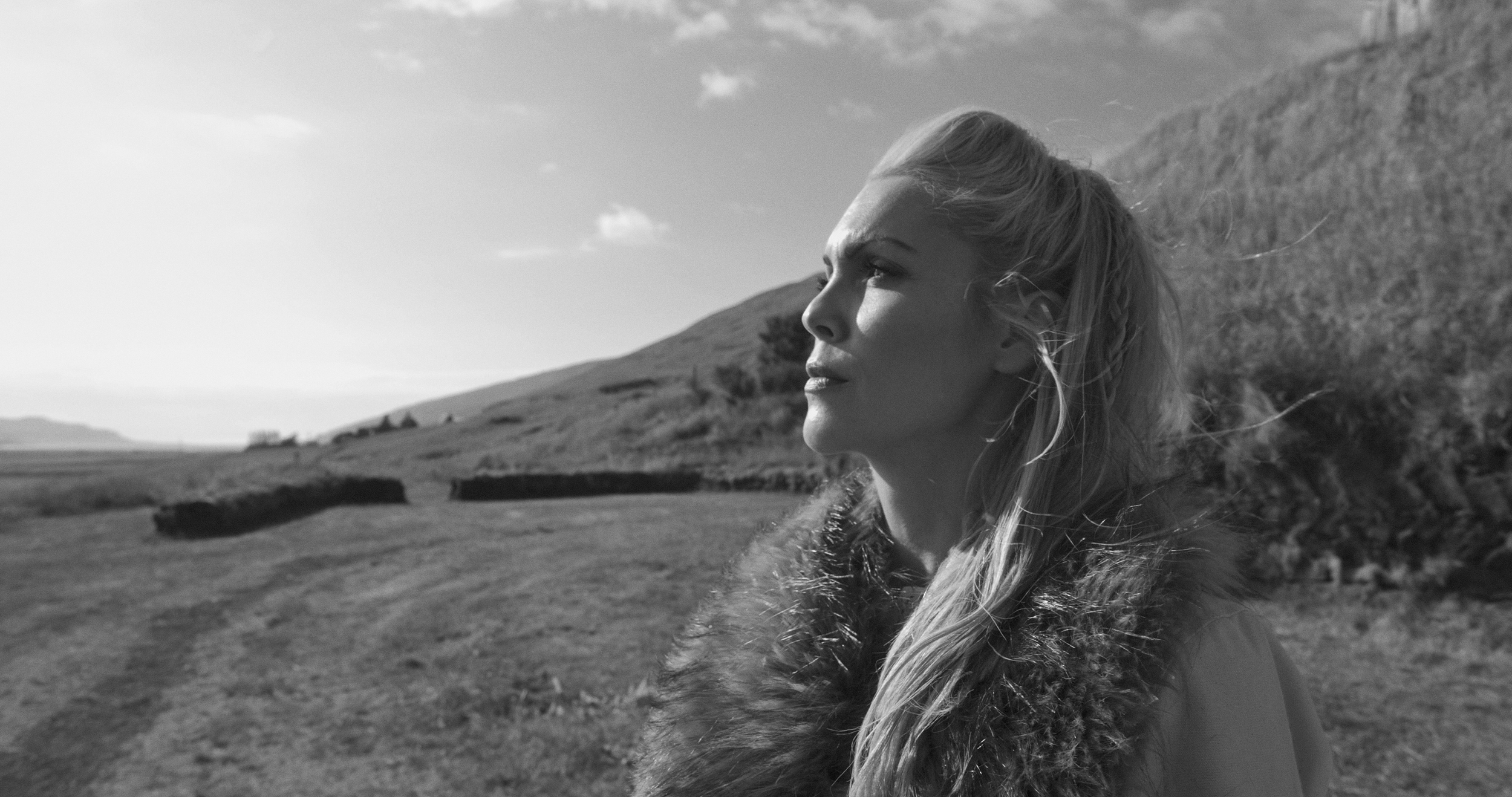Freydís and Gudrid: An Original Viking Opera Hits High Notes in Drama and Romance
By Thom Ernst
Rating: B
Composer and screenwriter Jeffrey Leiser turns director with Freydís and Gudrid. An original Nordic opera made for the screen. Freydís and Gudrid is based on Nordic myths and legends set in 800-1000 CE, a.k.a. the Viking Era.
If a Nordic opera set against a bleak Scandinavian landscape and overcast seas isn’t (potentially) alienating enough, Leiser decides to shoot the film in mostly black and white.
However, Leiser’s approach to making Freydís and Gudrid doesn’t appear to come from a place of division, but from a place of inclusion. Leiser shares rather than imposes his passion for Nordic storytelling (ignited after a trip to Iceland) and his career-long love of music.
Soprano Micaëla Oeste in the Viking opera Freydis and Gudrid
It hardly matters whether you embrace the operatic aspect of the film or resign to it, Leiser’s tale gets through. The story—that of a group of Viking merchants and explorers who set out to avenge the death of one of their own—is intact, along with all the implied elements of romance and drama.
I came to Freydís and Gudrid knowing only that it’s classified as a dramatic musical. I was also aware there were Vikings in it. I find the notion of singing Vikings with one or two show-stopping, toe-tapping barroom songs, and dance numbers agreeable. But whatever expectations I had as to what a Viking musical might look like, Freydís and Gudrid isn’t it. Leiser makes that clear from the film’s opening shot.
The film opens with Eric the Red (Bryan Glenn Davis) standing along the coastal shores of Greenland. A title card tells us that the year is 1004 A.D.C.E. Then, riding in on horseback is Gudrid (Micaëla Oeste), an unlikely image of beauty, purpose, and grace set against a bleak and grey terrain.
Gudrid joins Eric as a Viking ship arrives on shore. Then Eric sings. I’m guessing his voice is bass-baritone, but my knowledge of opera is too limited to know if it’s tenor, countertenor, baritone, or bass. It doesn’t matter because I am taken aback when the lyrics leave his mouth.
My thoughts of a Viking musical spectacle filled with whimsical ballads and show-stopping dance ensembles disintegrate. Prior knowledge that the film is an opera might help channel expectations, but then the expectation shifts to managing my preconceived notion about opera.
Yet moments after Gudrid’s entrance and Erik’s song, whatever alienating quality opera has on me disappears. Eric and Gudrid learn of Eric’s son’s death, presumably at the hands of the Indigenous peoples of Vinland, with whom they were trading goods.
Gudrid pushes for vengeance despite strong objections from the returning merchants. A return trip would mean Gudrid, pregnant and near delivery, saying goodbye to her husband, Karlsefini (Bray Wilkins). Since Karlsefini is held to his duty, Gudrid travels with him.
Stormy seas and bloodless battles follow. But Freydís and Gudrid's journey goes beyond the adventuring of retribution. This is also a story of community and bonding while sliding the envelope into areas of occupation and colonization.
The Indigenous peoples of Vinland approach the visiting group with openness and a willingness to resume trading, an opposing interpretation to the one given by the deceitful Haki (Raymon Geis).
And there are delightful moments with equally delightful songs. The performance of Lie Down My Love, by Karsefini is a touching operatic ballad boosted by the playful wanderings of two lovers—Karsefini and Gudrid—through the trees. Soon after, Gudrid gives birth assisted by the jealous Freydís (Kirsten Chambers). With this moment comes a scene of the quickest recovery from childbirth in the history of the world. (But extreme breaks in biological logic are a mainstay in musicals and opera and are to be expected).
But I am reminded of a conversation with my friend John Lennard. John is an accomplished jazz musician, and a past member of the bands Big Audio Dynamite and Theatre of Hate, the former fronted by former Clash guitarist Mick Jones. John points out that “art happens when the performer's passion triggers an unanticipated passion in the audience.”
That, in essence, is what Freydís and Gudrid does; it displays a passion without apology, explanation, or set-up. Leiser doesn’t seem too concerned about the specifics of the film’s genre: Musical, opera, drama, romance, or all of the above.
It’s not reluctance that prevents Leiser from divulging the driving force of the film’s narrative but rather a self-assured and less defensive “take-it-or-leave-it” attitude. The “opera” aspect of the film will be highlighted in the review and press material, but for Leiser, Freydís and Gudrid, it is simply a good story told through music.
Leiser made the film he wanted to make, and now, like a dutiful parent who raises a child to find their place in the world, he releases his passion project into the world to find its audience.
Freydís and Gudrid is directed, written and composed by Jeffrey Leiser and stars Micaëla Oeste, Bryan Glenn Davis, Kirsten Chambers, Bray Wilkins and Raymon Geis. Freydís and Gudrid begins streaming on Amazon Prime, July 7, 2024.



